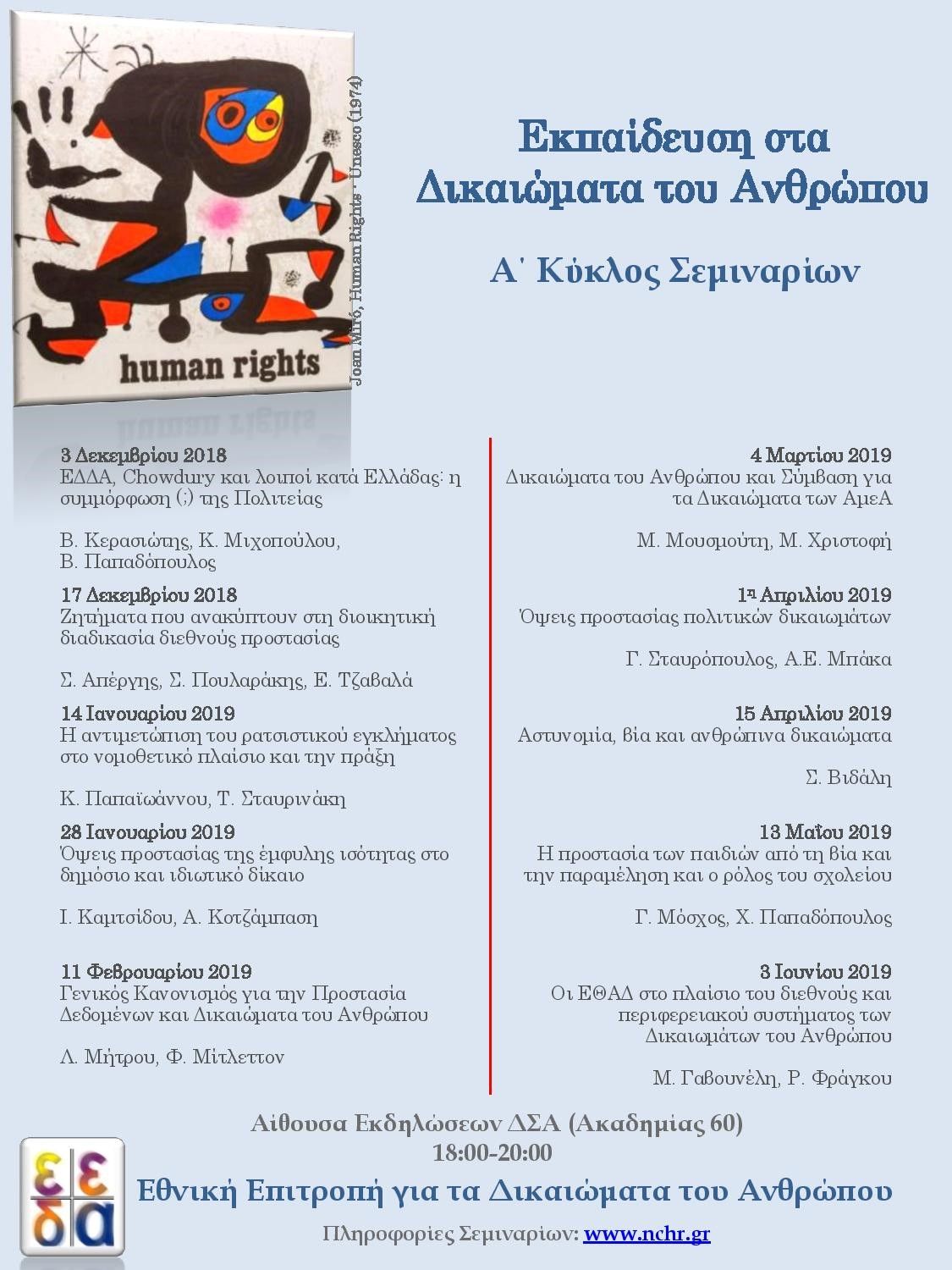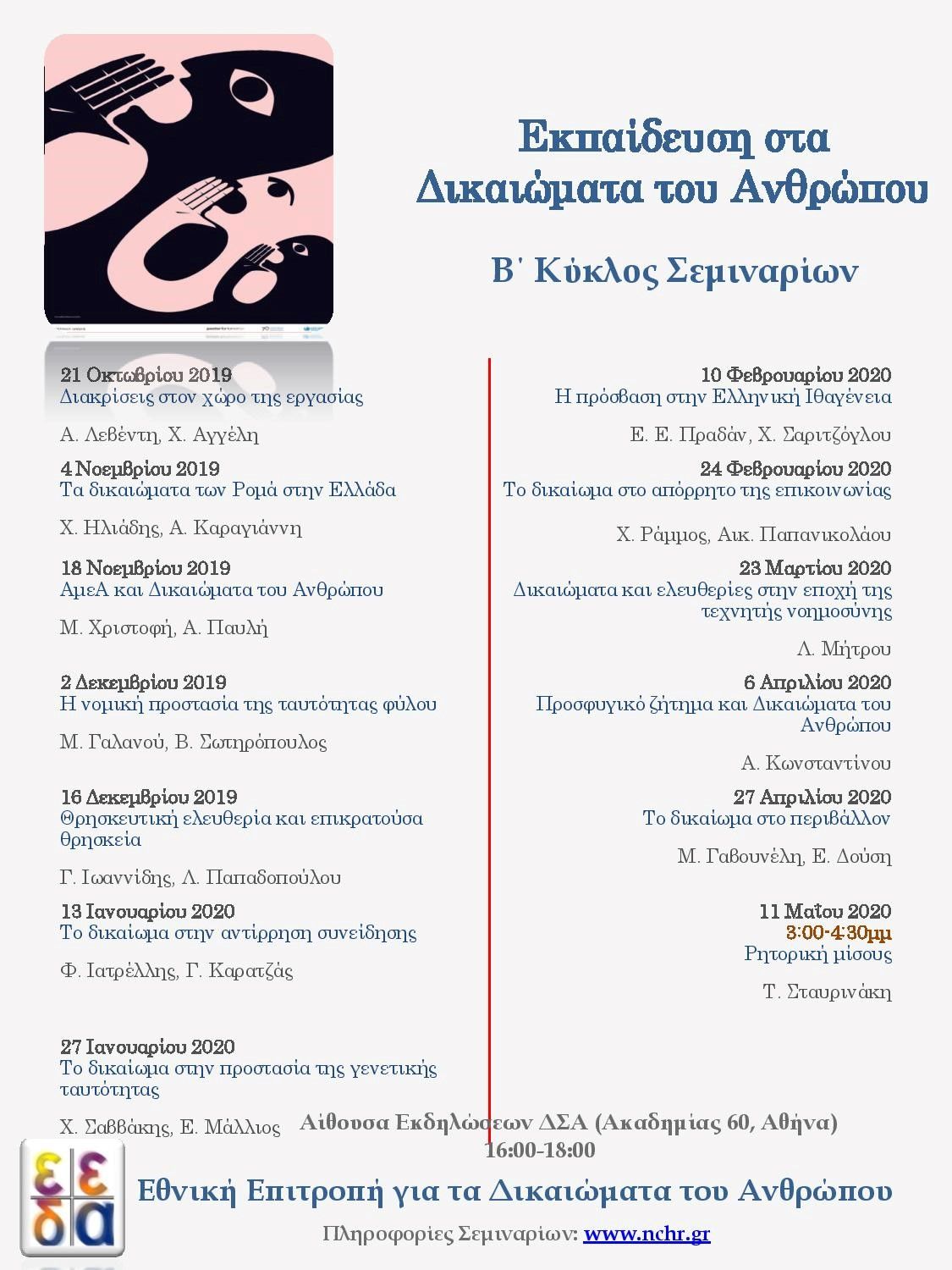
Human Rights Education and Training
The statutory mission of the GNCHR consists of, inter alia, the enhancement of the awareness for human rights within the educational system (article 12, case 6, of Law 4780/2021). The GNCHR recalls that human rights education is in itself a fundamental human right, which is enshrined in:
- the Preamble to the Universal Declaration of Human Rights, which introduces the value of human rights education, declaring that everyone must "must strive, through teaching and education, to promote respect for human rights and freedom and to secure their universal and effective recognition and observance",
- the provisions of international conventions which draw the attention of the Member States with regard to their obligation to educate citizens in their rights by choosing the appropriate means, such as Article 7 of the International Convention on the Elimination of All Forms of Racial Discrimination (CERD), 10 of the Convention on the Elimination of All Forms of Discrimination against Women (CEDAW), Article 29 of the Convention on the Rights of the Child (CRC), Article 10 of the Convention against Torture and Other Cruel, Inhuman or Degrading Treatment or Punishment (CAT) and Article 8 of the Convention on the Rights of Persons with Disabilities (CRPD),
- the UN Declaration on Human Rights Education and Training, in which Article 9 prescribes that "States should promote the establishment, development and strengthening of effective and independent national human rights institutions, in compliance with the principles relating to the status of national institutions for the promotion and protection of human rights (“the Paris Principles”), recognizing that national human rights institutions can play an important role, including, where necessary, a coordinating role, in promoting human rights education and training by, inter alia, raising awareness and mobilizing relevant public and private actors." (Resolution 66/137, A / RES / 66/137, 19 December 2011),
- the Vienna Declaration and Action Plan adopted at the UN World Conference on Human Rights on 25 June in Vienna, recalling the commitment of States Parties to ensure that education aims at the strengthening of the fundamental rights and freedoms (par. 33),
- the Principles regarding the Status of National Institutions (Paris Principles), according to which the NIHR should contribute to both the dissemination of human rights and the fight against discrimination, utilizing, inter alia, education (Paris Principles, A. 3.g΄), as well as in the formulation of programs for teaching and research in human rights and their implementation in schools, universities and professional circles (Paris Principles, A.3.f΄).
From the aforementioned points derives the obligation of both the NIHR and the public or private bodies which are working in the field of human rights to develop specific educational programs and activities that focus on the promotion of human rights. For all these reasons, besides, human rights education has been included in the hardcore of the GNCHR mission.
More specifically, recognizing that the cornerstone of human rights education is to introduce and integrate international human rights standards and practices into people's daily lives, the GNCHR has been developing the following actions in recent years:
Annual (Open) Seminar Season on "Education in Human Rights".
The training seminars are conducted on an annual basis and cover a wide range of critical issues related to human rights. They are cost-free and are addressed to the general public (undergraduate or postgraduate students of all Faculties of Various Sciences, as well as professional lawyers, judges, teachers, social workers, employees, etc.).
Training for professionals.
The GNCHR carries out high-level training courses adapted to the special needs of each professional field. In this context, the GNCHR has established Seminars for Prosecutors and participates systematically in training activities for lawyers.
In particular, the GNCHR conducted a Seminar Season on the protection of human rights for Prosecutors in its premises from March to May 2019. More specifically, the main issues which were presented consisted of the treatment of racist crime, the freedom of information and its relationship with the presumption of innocence, the police violence, the General Data Protection Regulation and the National Human Rights Institutions (NHRIs) within the international and regional system.
The GNCHR co-organized in cooperation with JUSTROM (a program of the Council of Europe and the European Commission for the access of women Roma to justice) two-day training seminars for lawyers in Athens, Thessaloniki and Xanthi, during the period of February - March 2019 with the title "Fight discrimination and access to justice for Roma women". The program included theoretical and practical training aimed at both the informing and raising awareness of lawyers on issues of rights, combat racism and access to justice for Roma women, cooperation with national entities for human rights and the provision of tools regarding the processing of cases concerning Roma, based on JUSTROM's experience.
The GNCHR participated in the seminar "TRAUMA", which was organized in June 2019 at the Athens Bar Association by the Bar Associations of EU and the Council of European Bar Associations, with regard to the rights of unaccompanied children. In the context of this seminar, the ECHR developed the national and international dimensions of the issue as well as the legal framework governing the rights of unaccompanied minors.
Education in schools.
The GNCHR develops issues related to human rights and its operation in a child-friendly and understandable way. In recent years, the GNCHR has trained on issues regarding the historical development of human rights, the protection of the rights of the child, the right to education, the women's rights, the respect for and assertion of human rights, and issues related to racism and intolerance.
In particular, the GNCHR visited the Experimental High School of Intercultural Education of Acharnes and participated in the training of its students in human rights. The training at hand took place on Tuesday, May 15, 2018, responding to the request of the school teachers.
The President of the GNCHR Prof. Maria Gavouneli carried out a presentation on Wednesday, October 2, 2019, to the students of 15th Elementary School of Athens on human rights, giving special emphasis on the rights of the child. Namely, issues related to the rights to life and communication with parents, freedom of expression, education, as well as issues related to refugee minors, non-discrimination, economic exploitation, and children with disabilities were raised and developed in a child-friendly way.
Cooperation with higher education institutions of the country.
The GNCHR, fulfilling its legal mission to promote research on issues related to human rights issues, has signed Cooperation Protocols with ten universities and departments, so that it can consolidate and strengthen their cooperation in both research and education fields. These acts consist of a very important step for the formal cooperation between the Greek higher education institutions of the country and the GNCHR in order to fulfill its mission, in the light of its contribution in the research and documentation of recommendations, proposals, studies, reports or and opinions regarding the human rights field which prepares and submits to the State. It is also being promoted the opportunity of students for practice in the human rights field at the GNCHR with the assignment of specialized tasks.
During the years 2018-2020, bilateral Cooperation Protocols were signed with (in chronological order):
- the Law School of the Aristotle University of Thessaloniki
- the Law School of the Democritus University of Thrace
- the Social Administration and Political Science Department of the Democritus University of Thrace
- the Political Science and Public Administration Department of the National and Kapodistrian University of Athens
- the Political Science and History Department of Panteion University of Social and Political Sciences
- the Law School of the National Kapodistrian University of Athens
- the Communication, Media and Culture Department of Panteion University
- the Social Anthropology Department of Panteion University of Athens
- the Political Science Department of the University of Crete
- the School of Economics and Public Administration of Panteion University of Athens
Also, the GNCHR collaborates, in particular with the Center for European Legal Culture (CELC) of the Aristotle University of Thessaloniki (AUTH), the Region of Central Macedonia, the Municipality of Thessaloniki, the Law School of the Aristotle University of Thessaloniki and the Bar Association of Thessaloniki for the co-organization of the Forum for Human Rights of Thessaloniki.
Education for University Students.
The GNCHR, in the context of its responsibilities for the promotion and education in the field of human rights, consistently responds to proposals for presentations at conferences, seminars and courses addressed to university students concerning the protection of human rights. In particular, the GNCHR has recently developed the following actions:
- The former President of the GNCHR George Stavropoulos gave a lecture on "The right to vote of Greeks residing abroad and the constitutional evaluation of the respective legislative proposals " in the context of the Postgraduate Program in Public Law and Political Science of Political Science Department of the Aristotle University of Thessaloniki. The lecture took place on February 28, 2018.
- The former President of the GNCHR George Stavropoulos gave a lecture on "Constitutional aspects of recent texts of the GNCHR" in the context of the Postgraduate Program in Public Law of the Law School of the National and Kapodistrian University of Athens. The lecture took place on March 14, 2018.
- The GNCHR made presentations to the Social Administration and Political Science Department of the Democritus University of Thrace. In particular, in the context of the presentation at hand, the Scientific Associates of the GNCHR developed the human rights framework, with particular emphasis on immigration issues, legislation on unaccompanied minors, and women's rights.
- The GNCHR participated in the Webinar on "Refugee Law and its Criminal Extensions" organized by the European Law Students' Association of Athens on 16 and 17 May 2020. The GNCHR was represented by the Scientific Associate Eva Tzavala who presented the issues on individual and social rights of refugees.


